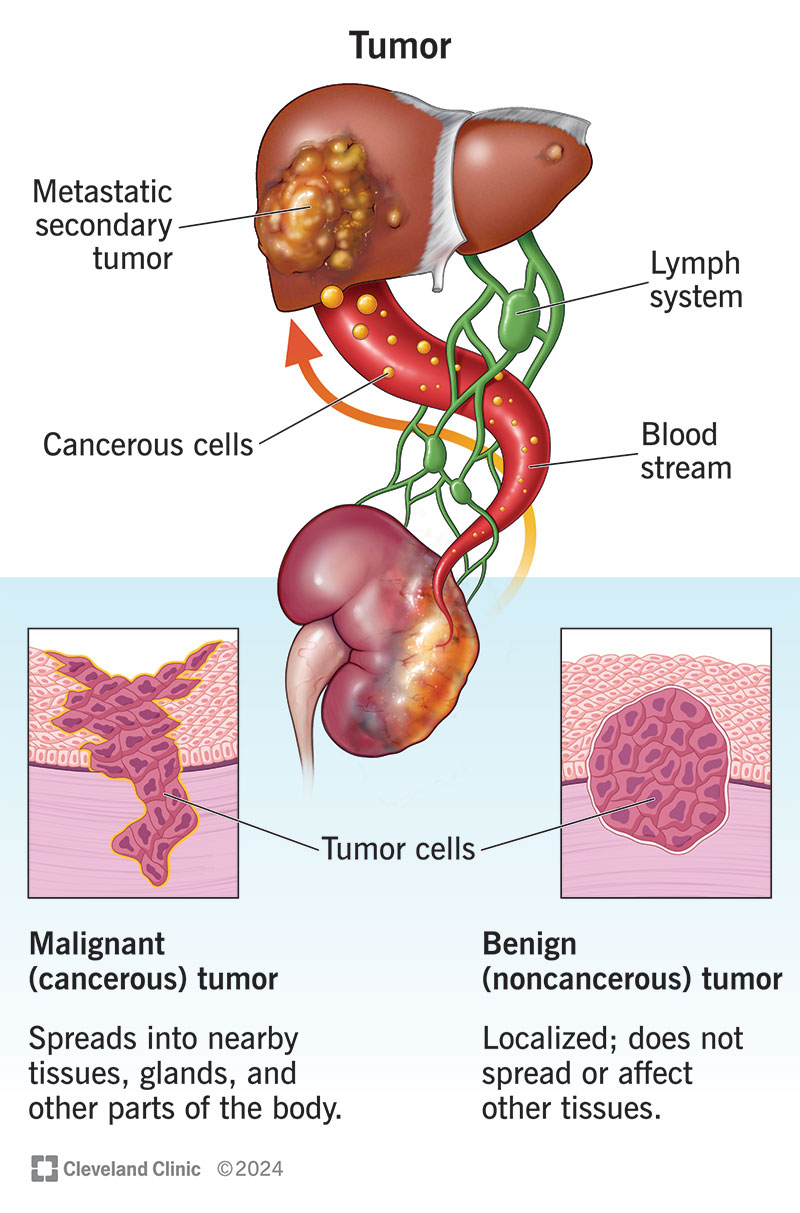A tumor (neoplasm) is a solid mass of tissue that forms when abnormal cells group together. They can form most anywhere in your body, including your bones, skin, tissue, organs and glands. Many tumors are benign, which means they’re not cancer. You may or may not need treatment for them. Cancerous, or malignant, tumors require cancer treatment.
Advertisement
Cleveland Clinic is a non-profit academic medical center. Advertising on our site helps support our mission. We do not endorse non-Cleveland Clinic products or services. Policy

Image content: This image is available to view online.
View image online (https://my.clevelandclinic.org/-/scassets/Images/org/health/articles/tumor)
A tumor, or neoplasm, is a mass of abnormal cells that form in your body. Tumors can affect tissues, glands, organs, skin and bone. They can be big or small. You can have a single tumor or more than one.
Advertisement
Cleveland Clinic is a non-profit academic medical center. Advertising on our site helps support our mission. We do not endorse non-Cleveland Clinic products or services. Policy
Many people hear the word “tumor” and immediately think “cancer.” But many neoplasms are benign (noncancerous). Your healthcare provider can explain what having a tumor means for your health (including how serious it is) based on the type.
The three main types of tumors are:
Advertisement
It’s easy to confuse tumors and cysts because they’re both unexpected growths. But they’re not the same. A tumor is a solid mass of tissue. It may or may not be cancerous. A cyst is a small sac that may contain fluid, air or other tissue. Most cysts aren’t cancerous.
Tumor symptoms vary depending on where it develops, how big it is and whether it’s cancerous. You may be able to feel the mass, as with a breast lump. You may be able to see a bump or a raised, abnormal area of skin if the neoplasm is close to your skin’s surface. But you can’t always tell you if you have a tumor just by looking or feeling for one.
In some cases, tumors cause symptoms like:
The tumors that you can detect through touch often feel like a new bump or lump. Cancerous tumors are more likely to feel firm to the touch than benign lumps or cysts. They may also feel less movable. Still, this isn’t always the case. The only way to know for sure whether a lump is a tumor or a cyst— malignant or benign — is to have a healthcare provider check it.
Tumors form when abnormal cells pile up, creating an overgrowth, or mass.
Your body constantly makes new cells to replace old or damaged ones that die off. For a neoplasm to form, the cells don’t die off as expected. Or, new cells grow and multiply faster than they should. The cells accumulate, causing the tumor to grow.
Tumors can affect anyone. The specific factors that increase your chances of developing a neoplasm vary based on the type. But general risk factors for tumors include:
Complications of tumors may include:
Advertisement
Your healthcare provider will perform a biopsy to determine whether a tumor is cancerous. A biopsy involves removing cell samples from the neoplasm. A pathologist examines the samples in a lab to make a diagnosis. If a tumor is in an area that’s difficult to reach, your provider may remove the entire tumor and then do a biopsy.
You may also get:
Treatments for a tumor depend on many factors, including the type (malignant or benign) and location.
Many noncancerous tumors don’t need treatment. But some can continue to grow. For example, benign brain tumors can press against healthy tissue, affecting vision or speech. If this happens, your healthcare provider may recommend surgery to remove the tumor.
Treatments for cancerous tumors include:
Advertisement
The outlook is usually excellent for precancerous and benign tumors. If a tumor is precancerous, your provider can monitor its growth or remove it before it causes issues. Most benign neoplasms don’t require treatment unless they place pressure on sensitive tissue or organs.
For malignant tumors, your outlook depends on many factors, like tumor type and its stage (how advanced it is). Some are curable with surgery while others tend to grow fast and spread quickly. Malignant neoplasms that have spread are harder to treat.
Most tumors occur for no known reason, so you can’t always prevent them. Still, you can potentially reduce your risk if you:
You can catch malignant tumors early (when they respond best to treatment) by getting all recommended age-appropriate screenings, including:
Advertisement
You should call a healthcare provider if you notice a new or changing lump anywhere on your body. You should also contact them if you experience:
You may want to ask your healthcare provider:
Learning that you have a tumor can feel unsettling and scary. But you should know that many tumors are benign and don’t need treatment. If a tumor is cancerous, there are a lot of treatment options. Receiving prompt treatment can make a big difference when it comes to your outlook. Cancer therapies can destroy cancer cells, prevent them from spreading and lower the risk of cancer coming back. Often, people live many years after receiving treatment for cancerous tumors. Your healthcare provider will discuss your treatment options with you.

Sign up for our Health Essentials emails for expert guidance on nutrition, fitness, sleep, skin care and more.
Learn more about the Health Library and our editorial process.
Cleveland Clinic’s health articles are based on evidence-backed information and review by medical professionals to ensure accuracy, reliability and up-to-date clinical standards.
Cleveland Clinic’s health articles are based on evidence-backed information and review by medical professionals to ensure accuracy, reliability and up-to-date clinical standards.
When you’re diagnosed with cancer, you want expert and compassionate care right away. At Cleveland Clinic we personalize your treatment to match your needs.
